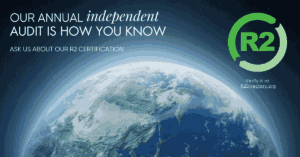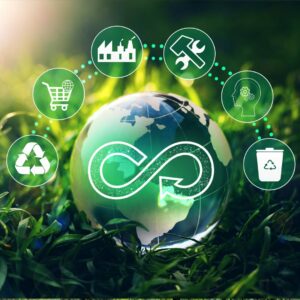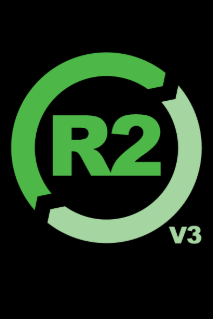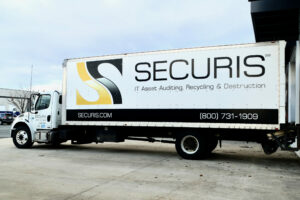R2v3 is a comprehensive sustainability certification assuring the highest global electronics reuse and recycling standards.
 In today’s fast-paced technological environment, businesses must effectively manage and dispose of outdated electronic assets, including computers, tablets, smartphones, and storage devices. This process, known as asset disposition, is essential for keeping equipment current while ensuring the safe and environmentally compliant handling of electronic waste (e-waste). Partnering with an R2v3-certified e-waste recycling company is the most secure and cost-effective approach to managing the inevitable IT refreshes that your company will need.
In today’s fast-paced technological environment, businesses must effectively manage and dispose of outdated electronic assets, including computers, tablets, smartphones, and storage devices. This process, known as asset disposition, is essential for keeping equipment current while ensuring the safe and environmentally compliant handling of electronic waste (e-waste). Partnering with an R2v3-certified e-waste recycling company is the most secure and cost-effective approach to managing the inevitable IT refreshes that your company will need.
When evaluating potential providers for responsible e-waste disposal, verifying their claims regarding secure data destruction and environmentally friendly recycling practices is crucial. How can you know if they are being truthful? R2v3 certification is a reliable indicator that a vendor meets stringent requirements for electronics recycling and refurbishment. For some companies, R2v3 certification is a nice to-have feature, but Federal agencies are required to dispose of electronic assets in an environmentally responsible way as outlined in GSA Bulletin FMR B-34 Disposal of Federal Electronic Assets. FMR B-34 requires Federal Electronic Asset (FEA) recyclers to be R2 certified.
The R2v3 certification is not merely a management system but a comprehensive sustainability standard aimed at achieving positive outcomes in electronic waste management. As an R2v3 Certified Facility, we undergo independent audits to ensure compliance with the highest global electronics reuse and recycling standards. In addition, any services we perform nationwide via our mobile services adhere to the same strict standards, with all assets returned to our facility for responsible R2 certified recycling.
What is R2v3 Certification?
 The Responsible Recycling (R2v3) certification is a globally acknowledged electronics recycling and refurbishment standard. Developed by Sustainable Electronics Recycling International (SERI), the R2v3 standard mandates that certified facilities adhere to strict environmental, health, safety, and data security protocols. It is the most widely adopted sustainability standard for electronics recycling and refurbishment, applicable to facilities of all sizes and locations.
The Responsible Recycling (R2v3) certification is a globally acknowledged electronics recycling and refurbishment standard. Developed by Sustainable Electronics Recycling International (SERI), the R2v3 standard mandates that certified facilities adhere to strict environmental, health, safety, and data security protocols. It is the most widely adopted sustainability standard for electronics recycling and refurbishment, applicable to facilities of all sizes and locations.
What is the Difference between R2 and R2v3 Certification?
R2 and R2v3 are both certifications for responsible electronics recycling, but R2v3 is the latest and more comprehensive version. R2 (Responsible Recycling) was initially developed in 2008 and has undergone several iterations. R2v3, released in 2020, is the most recent version of the standard. R2v3 expands on the original R2 standard with more stringent and detailed requirements in areas of data security, specialty processes, facility certification (R2v3 requires each individual facility to be certified independently, unlike previous versions that allowed multiple sites under one certification), strengthened environmental health and safety standards and heightened downstream tracking requirements. While R2 and R2v3 certifications aim to ensure responsible electronics recycling, R2v3 represents a significant upgrade with more comprehensive, flexible, and stringent requirements to address modern industry challenges and environmental concerns.
“R2 Certification is what separates self-made claims by companies from those that have been audited and verified to actually be doing the right things. That’s a big difference, and it is what the world has come to value in R2-certified facilities.” – Corey Dehmey, CEO of SERI
Benefits of Using an R2v3-Certified Recycler for IT Asset Disposition
Data Security and Compliance
 One of the primary concerns in asset disposition is ensuring data security in ITAD.
One of the primary concerns in asset disposition is ensuring data security in ITAD.
R2-certified e-waste recycling services must implement strict data security protocols to prevent breaches and unauthorized access to sensitive information. This includes documented processes for data sanitization tailored to various device types and sensitivity levels and access restriction to authorized personnel only.
Certified facilities must maintain controls for data protection throughout the recycling process, including secure storage and handling of devices containing sensitive information. R2v3-certified recyclers must use robust media sanitization methods, such as data wiping, magnetic degaussing, and physical destruction, to thoroughly and irreversibly erase data from devices. In addition, they must adhere to specific time frames for performing this sanitization to minimize risks further.
R2v3 certification also ensures that recyclers have quality management systems (ISO 9001) and environmental management systems (ISO 14001) certifications. This helps companies avoid fines and legal issues associated with improper e-waste disposal. It also provides peace of mind for the client, knowing that all regulatory requirements are met. SERI conducts spot inspections of R2 facilities, so ongoing compliance is assured.
Assured Environmental Responsibility
 Many companies have corporate social responsibility (CSR) considerations to fulfill. They must adhere to electronic waste disposal standards and e-waste legal regulations, ensuring that hazardous material disposal is properly managed. They must also implement best practices for recycling electronic waste that maximize material recovery and reuse, and minimize landfill use. Making headlines for illegally dumping electronic waste would have far-reaching reputational consequences for many companies.
Many companies have corporate social responsibility (CSR) considerations to fulfill. They must adhere to electronic waste disposal standards and e-waste legal regulations, ensuring that hazardous material disposal is properly managed. They must also implement best practices for recycling electronic waste that maximize material recovery and reuse, and minimize landfill use. Making headlines for illegally dumping electronic waste would have far-reaching reputational consequences for many companies.
R2v3-certified companies must follow rigorous environmental practices to minimize the impact of e-waste and demonstrate responsible recycling practices and environmental responsibility in ITAD. The R2 certification applies to environmental responsibility at the vendor facility. It extends environmental protections beyond the primary facility, requiring full tracking and documentation of e-waste as it moves through the recycling chain. This requires R2v3 certified vendors to ensure their downstream partners also adhere to strict e-waste recycling standards. Knowing that your vendor is R2v3 certified allows companies needing IT asset recycling and recovery to ensure they can increase ESG scores and fulfill CSR goals simply by working with a partner with this certification.
Reputation and Trust
 Partnering with an R2v3 certified recycler enhances a company’s reputation by demonstrating a commitment to responsible e-waste management. This builds trust with customers, stakeholders, and employees and aligns with corporate social responsibility (CSR) initiatives.
Partnering with an R2v3 certified recycler enhances a company’s reputation by demonstrating a commitment to responsible e-waste management. This builds trust with customers, stakeholders, and employees and aligns with corporate social responsibility (CSR) initiatives.
R2v3 certification is not just earned once, annual audits are required as well as documentation of process improvements and updates to maintain certification, ensuring ongoing compliance and commitment to excellence in the field of IT asset recycling and recovery. These audits make sure that the R2v3 certified vendor is fulfilling all of the requirements of R2v3 certification on an ongoing basis, and that all workers are always properly trained on data security procedures. Internal data security audits are also required to assess conformance with customer requirements and R2v3 standards. In addition, certified vendors must stay updated on evolving data protection regulations and industry best practices.
Partnering with R2v3-certified vendors demonstrates a commitment to sustainability and responsible business practices. This can lead to enhanced brand image and increased customer loyalty, as well the potential for attracting environmentally conscious investors to your company.
“R2 sets a high bar for facilities who process used electronics for reuse and recycling. It’s comprehensive, including best practices for protecting the environment, data, the health and safety of workers, and communities all around the world. That’s why customers can feel confident working with R2 Certified partners will help support critical internal ESG, data security, and sustainability goals.” – Mike Easterbrook, Chief of Global Standards
R2v3 certification ensures safe and compliant ITAD processes
 R2v3-certified companies follow standardized and transparent processes for e-waste management compliance. This includes thorough documentation and reporting, which is essential for auditing and tracking purposes. Strict chain of custody controls and downstream due diligence documentation is required, including the tracking of all electronic materials from receipt to final disposition, documentation of downstream recycling partners and their practices as well as verification of final material disposition.
R2v3-certified companies follow standardized and transparent processes for e-waste management compliance. This includes thorough documentation and reporting, which is essential for auditing and tracking purposes. Strict chain of custody controls and downstream due diligence documentation is required, including the tracking of all electronic materials from receipt to final disposition, documentation of downstream recycling partners and their practices as well as verification of final material disposition.
In addition, Organizations that achieve an R2v3 certification must establish a comprehensive management system that includes policies and procedures covering all aspects of operations, including the implementation of safety measures to protect workers from hazards and proper training on the safe handling of materials and equipment.
The following records and reports must also be maintained:
- Inventory tracking records
- Inbound and outbound shipment documentation
- Data sanitization and destruction records
- Testing and auditing device records
- Training records
- Internal audit reports
- Corrective action records
- Facility inspection reports
- Accident and incident reports
- Management review meeting minutes
- Customer complaints and feedback
- Supplier evaluation records
- Equipment calibration and maintenance logs
By maintaining thorough documentation and reporting systems across these areas, organizations demonstrate their adherence to R2v3 standards and maintain certification. The process requires meticulous record-keeping and a commitment to transparency throughout all operations related to electronic recycling and data destruction.
Economic Benefits
 By partnering with an R2v3-certified recycler, companies can also realize economic benefits. R2v3 certified recyclers must efficiently recover valuable materials from e-waste, which can be refurbished and resold, thus reducing the overall cost of asset disposition. Having an R2v3 certification supports a circular economy, meaning that a vendor will ensure that all devices are used as long as possible, and then when devices can no longer be used, refurbish electronic devices and their components wherever possible. At the true end of life, a circular economy means recovering materials so they can become part of something new, whether that’s a new electronic device or something entirely different.
By partnering with an R2v3-certified recycler, companies can also realize economic benefits. R2v3 certified recyclers must efficiently recover valuable materials from e-waste, which can be refurbished and resold, thus reducing the overall cost of asset disposition. Having an R2v3 certification supports a circular economy, meaning that a vendor will ensure that all devices are used as long as possible, and then when devices can no longer be used, refurbish electronic devices and their components wherever possible. At the true end of life, a circular economy means recovering materials so they can become part of something new, whether that’s a new electronic device or something entirely different.
R2v3-certified vendors adhere to stringent data security and environmental standards, which helps minimize legal and financial risks for their business partners. This can lead to lower insurance costs, reduced risk of data breaches and associated penalties, and minimized environmental liability for your company.
R2v3 certified vendors often have more efficient processes for handling end-of-life electronics, resulting in lower disposal costs for old IT equipment, potential revenue or rebates from the resale of refurbished devices, and reduced expenses related to data destruction and environmental compliance.
In addition, R2v3 certification ensures that vendors are up-to-date with the latest regulations. This helps businesses avoid costly fines and penalties, streamline compliance efforts, and reduce the resources needed for regulatory management.
Conclusion – Enhance Your Brand Reputation With R2v3-certified E-waste Recycling
In an era where sustainability, data security, and e-waste regulatory compliance are paramount, choosing an R2v3-certified e-waste recycling company for asset disposition is a smart and responsible decision. Responsible ITAD vendor selection ensures the secure and environmentally responsible handling of electronic assets, reinforces a company’s commitment to ethical practices, and enhances its reputation. The R2v3 standard is regularly updated to address evolving industry needs and challenges. By partnering with an R2v3-certified recycler, your company can confidently manage its e-waste, knowing it complies with industry standards and contributes to a more sustainable future.
R2v3 isn’t just a data security, OR environmental, OR worker health and safety standard. It is an electronics sustainability standard, which means it is a data security standard, AND an environmental standard, AND a standard that protects worker health and safety. That means when you choose an R2v3 Certified Facility like Securis, you check many boxes in your ITAD vendor selection process.


 Key Factors in Choosing a Secure and Responsible IT Asset Disposition (ITAD) Partner
Key Factors in Choosing a Secure and Responsible IT Asset Disposition (ITAD) Partner
 Transparency is a crucial indicator of a responsible e-waste partner. Ideally, an ITAD partner should provide comprehensive and accurate reporting for the entire chain of custody. Ensure your chosen vendor:
Transparency is a crucial indicator of a responsible e-waste partner. Ideally, an ITAD partner should provide comprehensive and accurate reporting for the entire chain of custody. Ensure your chosen vendor:
 Beyond security, accuracy, and sustainability, consider the following factors.
Beyond security, accuracy, and sustainability, consider the following factors.